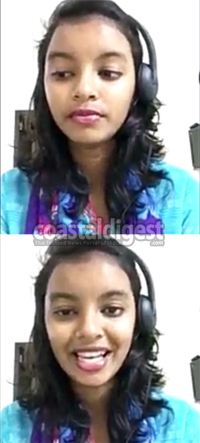It was her love for singing that encouraged Munaz Mariam, a 19-year-old from Mangaluru, to participate in an online initiative aimed towards creating bonds among youth from different backgrounds through music.

SAMAA - a band based in Chicago, USA - invited people to send cover versions of two popular Bollywood songs, in an effort to bring them together. When the initiative #singwithSAMAA was started initially, the band received responses not only from India, but also from Pakistan and other countries. It was then that SAMAA decided to select entries from singers of all nationalities.
 When Munaz decided to send her cover version of 'Zaalima' from the Bollywood movie 'Raees' to this initiative three months ago, little did she expect that she would be featured in the final video compilation. Along with Munaz, the video features covers of 'Zaalima' , 'Afreen' and 'Sajde Kiye Hain Lakhon' sung by other Indians and Pakistanis, and two singers from Qatar and USA.
When Munaz decided to send her cover version of 'Zaalima' from the Bollywood movie 'Raees' to this initiative three months ago, little did she expect that she would be featured in the final video compilation. Along with Munaz, the video features covers of 'Zaalima' , 'Afreen' and 'Sajde Kiye Hain Lakhon' sung by other Indians and Pakistanis, and two singers from Qatar and USA.
This video was uploaded by SAMAA on Facebook and YouTube, and has gathered over 2.8 lakh Views and over six thousand Likes since then. A look at the musical video shows people from India, Pakistan, Qatar and USA with a real talent for singing.
A student of St Aloysius College in Mangaluru, Munaz came across this initiative through SAMAA's social outlets and decided to give it a try. "It was a spontaneous decision and I had not expected that my cover would be selected. Their response was immediate and I was elated at the selection," she said. Munaz was further excited after the release of the final video when she realised she was the only singer from Karnataka to be featured.
"I had submitted my cover song keeping in mind that I was an ordinary singer and I am really happy at being featured. Some of the other singers in the video are really good," said Munaz, who was also joyous at the positive comments she received in response to the video.
Other singers from India such as Anmol from New Delhi, Mahima and Vaibhavi from Mumbai, Sravya from Hyderabad, Chayanika from Golaghat and Vaidehi from Badlapur are featured in the compilation, while those from Pakistan include Ali from Sialkot, Dr Rabail from Hyderabad (Pak) and Mobeen from Islamabad. Vinutha from Doha, Qatar and Justin from New Jersey, USA have also been featured. Interestingly, another singer in the video, Romesa from Lahore, Pakistan, is only a little girl.
At a time of restlessness and animosity between sections of people in India and Pakistan, efforts such as #singwithSAMAA initiative come like a whiff of fresh air. It also goes on to show that music can indeed bring people together.
With her participation in the musical endeavour, Munaz has not only helped towards building bridges across borders, but has also formed new friendships in the process.


















Comments
wow nice to hear! festival for ears.
Young Girl ! it would be better for you to recite your lord's word instead of film songs... God has given you a beautiful voice. please contemplate on reciting the word of God. Make a video of your lord's word so that many people who are unaware of their creator will know thru your beautiful voice.
Add new comment